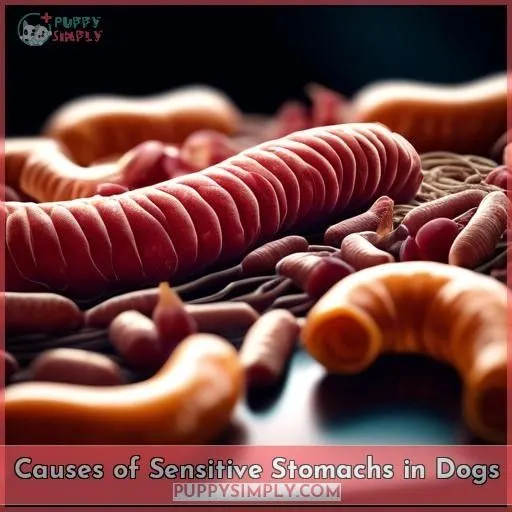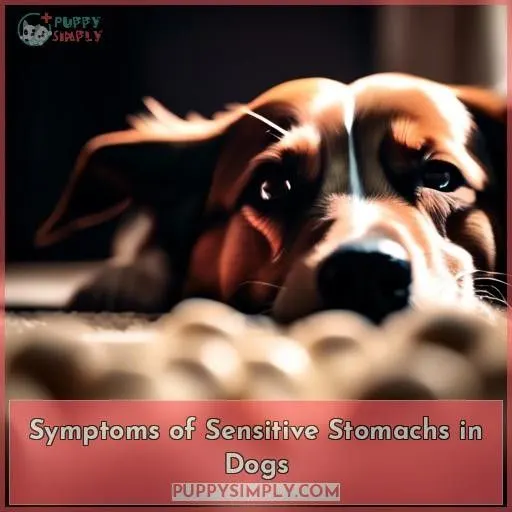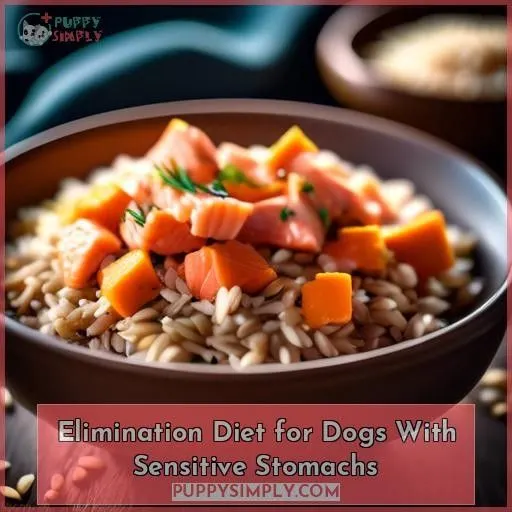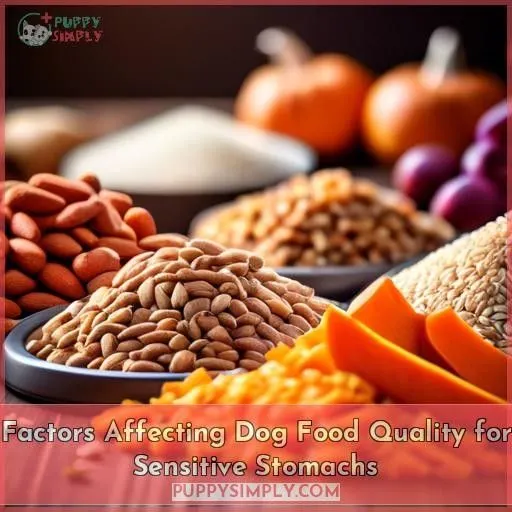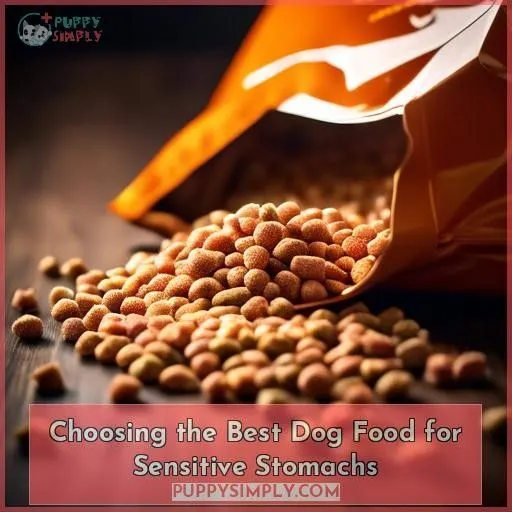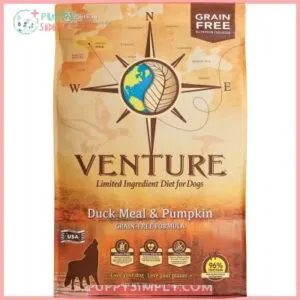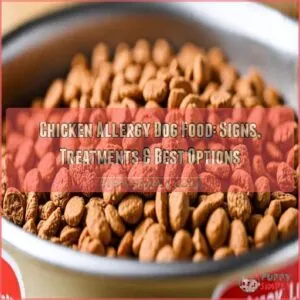This site is supported by our readers. We may earn a commission, at no cost to you, if you purchase through links.
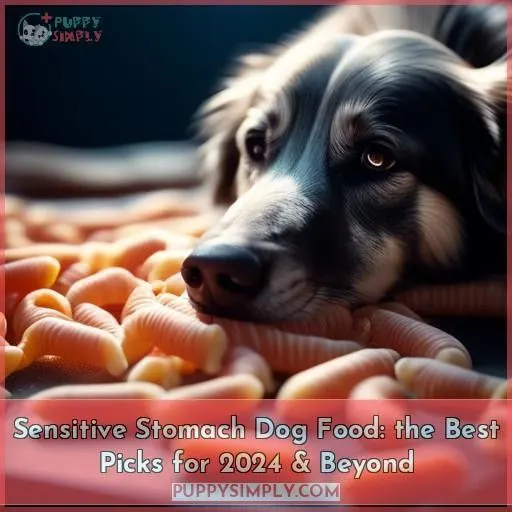
As a dog owner with a pup dealing with a sensitive stomach, finding the right sensitive stomach dog food is vital. Factors like protein source, fiber, fat content, vitamins, and ingredient quality all affect digestibility. Consult your vet and review dog food labels to identify complete and balanced formulas.
Look for dog foods like Earthborn Holistic Venture Duck Pumpkin that use premium ingredients customized to sensitive stomachs. An elimination diet and monitoring non-food items can also aid in managing symptoms such as vomiting and loose stools.
With the right sensitive stomach dog food, you can help your furry companion feel their best. Continue reading to explore the most suitable options in depth.
Table Of Contents
- Key Takeaways
- Causes of Sensitive Stomachs in Dogs
- Symptoms of Sensitive Stomachs in Dogs
- Elimination Diet for Dogs With Sensitive Stomachs
- Factors Affecting Dog Food Quality for Sensitive Stomachs
- Choosing the Best Dog Food for Sensitive Stomachs
- 10. Earthborn Holistic Venture Duck Pumpkin Dog Food
- Frequently Asked Questions (FAQs)
- Conclusion
Key Takeaways
- Identifying the right sensitive stomach dog food involves considering factors such as protein source, fiber content, fat levels, vitamins, and the quality of ingredients to ensure digestibility and nutritional balance.
- Causes of sensitive stomachs in dogs can range from food intolerances and dietary deficiencies to more serious conditions like gastrointestinal cancer, highlighting the importance of understanding underlying issues for effective management.
- Implementing an elimination diet and closely monitoring your dog’s intake of non-food items are crucial steps in managing symptoms like vomiting and loose stools, and in identifying dietary triggers.
- Consulting with a veterinarian or veterinary nutritionist is essential in choosing the best dog food for sensitive stomachs, as they can provide personalized recommendations based on your dog’s specific needs and health history.
Causes of Sensitive Stomachs in Dogs
Is your dog dealing with a sensitive stomach? The causes can range from stomach cancer and food intolerances to dietary deficiencies and consuming non-food items. Understanding the potential underlying issues is the first step in finding the right solution for your canine companion.
Stomach Cancer
Stomach cancer in dogs is a serious medical condition that requires prompt diagnosis and treatment. Though less common than other types of cancer, it’s often aggressive and can spread rapidly, affecting both the quality of life and lifespan of the animal. Understanding the causes and symptoms of stomach cancer in dogs can help in the early identification and prevention of this devastating disease.
- Age: Stomach cancer is more commonly observed in older dogs, typically those over the age of eight.
- Genetics: Some breeds are more susceptible to stomach cancer, including Chow Chows, Belgian Shepherds, and Standard Schnauzers.
- Diet: Dogs fed low-quality diets high in preservatives and additives may have an increased risk of developing stomach cancer.
- Environmental Factors: Exposure to toxic chemicals, secondhand smoke, and other environmental pollutants can also be contributing factors.
- Chronic Gastritis: Long-term inflammation of the stomach lining may predispose a dog to developing gastric cancer.
Symptoms of stomach cancer in dogs include:
- Loss of Appetite: A significant change in eating habits, including a reduced appetite.
- Weight Loss: Unexplained weight loss, often accompanied by loss of appetite.
- Vomiting: Frequent episodes of vomiting, sometimes with blood.
- Abdominal Pain or Discomfort: Exhibited by hunched posture, excessive panting, or restlessness.
- Lethargy: A general decline in activity levels and enthusiasm for activity.
Early detection of stomach cancer in dogs is vital for successful treatment. Regular veterinary check-ups, including blood tests and ultrasound, can help in the early detection of abnormalities, including cancerous growths. By taking proactive measures to minimize risk factors and improve overall health, you can make strides in promoting a healthier, and hopefully cancer-free, life for your dog.
Food Intolerances
Food intolerances can be a common cause of sensitive stomachs in dogs. These intolerances are often related to specific ingredients in dog food, such as protein sources like chicken, beef, or lamb, or fiber sources like beet pulp. Some dogs may also have issues with the fat content, vitamins, or minerals in their food. The quality of ingredients can also play a role in digestive issues. If your dog is experiencing symptoms like occasional vomiting, loose stools, or flatulence, it may be worth considering a food intolerance as a potential cause.
To address food intolerances, consider implementing an elimination diet. This involves eliminating non-dog food items from your dog’s diet, monitoring for food sneaking, and evaluating the dog food if symptoms persist. If necessary, consult with a veterinarian or veterinary nutritionist for guidance on how to proceed.
When choosing a dog food for sensitive stomachs, look for complete and balanced formulas that are appropriate for your dog’s age, size, and health status. Analyze the dog food labels to understand the protein, fiber, and fat content. Consider feeding trials and nutritional analysis to make sure the food is of high quality.
Incorporating ingredients like sweet potatoes, carrots, pumpkin, ginger, turmeric, blueberries, coconut oil, lamb, chicken, salmon, turkey, and vitamin supplements can help support digestive health in dogs with sensitive stomachs. Always consult with a veterinarian before making any significant changes to your dog’s diet.
Dietary Deficiencies
Dietary insufficiencies can result in delicate stomachs in dogs, as their bodies may not obtain the essential nutrients for optimal gut well-being and digestive enzyme production. Here are four crucial areas to focus on when addressing dietary insufficiencies:
- Nutritional Requirements: Dogs require a balanced diet that includes proteins, fats, carbohydrates, vitamins, and minerals. A shortage in any of these nutrients can lead to digestive problems.
- Gut Health: A healthy gut is essential for proper digestion and nutrient absorption. Dietary insufficiencies can disrupt the equilibrium of beneficial bacteria in the gut, leading to inflammation and delicate stomachs.
- Digestive Enzymes: Enzymes such as protease, amylase, lipase, and cellulase assist in breaking down food molecules into smaller components that the body can absorb. A shortage in these enzymes can result in poor nutrient absorption and digestive issues.
- Probiotics: Probiotics are beneficial bacteria that support gut health and help maintain a balanced gut microbiome. A shortage in probiotics can lead to an overgrowth of harmful bacteria, causing digestive problems.
To address dietary insufficiencies, consider the following:
- Quality Diet for Dogs: Opt for high-quality dog food that’s complete and balanced, with easily digestible ingredients and prebiotics to support gut health.
- Food Trials: Consult with your veterinarian to determine if a change in protein or fiber source, or the addition of digestive enzymes or probiotics, may help improve your dog’s digestion.
- Supplements: If your dog isn’t receiving enough nutrients from their diet, consider adding digestive enzyme supplements or probiotics to their meals.
- Monitoring: Observe your dog’s stool for indications of digestive issues, such as diarrhea, constipation, or blood in the stool, and adjust their diet accordingly.
Excessive Fat Intake
Excessive fat intake can lead to digestion issues in dogs, causing sensitive stomachs. High-quality sensitive digestion dog food should have a minimum crude fat of less than 17%. Limited-ingredient diets with novel proteins and hydrolyzed protein can help. Reduced-fat diets may also be beneficial for dogs with sensitive stomachs. Portion control is essential, as overfeeding can contribute to excessive fat intake.
Non-Food Items Consumed
Non-food items consumed, such as trash or treats, can also cause sensitive stomachs in dogs. Dogs may eat non-food items due to curiosity, boredom, or a more serious condition like pica. These items can cause digestive upset, obstructions, or even be toxic to the dog’s system.
To address this issue, it’s imperative to monitor your dog’s behavior and environment, ensuring they have access to safe and appropriate toys and treats. If you suspect your dog has consumed something they shouldn’t have, contact your veterinarian immediately.
Additionally, consider a diet change, focusing on high-quality, easily digestible ingredients, and avoiding common allergens like beef, chicken, and wheat. Regular check-ups with your vet can help identify any potential health problems early on and allow for dietary adjustments as needed.
Symptoms of Sensitive Stomachs in Dogs
If your dog is experiencing occasional vomiting, loose stools, or excessive flatulence, these may be signs of a sensitive stomach. Monitoring your dog’s digestive symptoms can help you identify potential dietary triggers and work with your veterinarian to find the best dog food for sensitive stomachs.
Occasional Vomiting
If your canine companion is experiencing intermittent regurgitation, it may stem from a delicate digestive system. Here are five potential reasons why your furry friend may be vomiting:
- Food sensitivities: Your dog may be unable to tolerate specific proteins, such as avian or bovine meat, leading to vomiting.
- Dietary insufficiencies: A deficit of vital nutrients, such as roughage or vitamins, can contribute to digestive ailments and emesis.
- Excessive lipid consumption: Ingesting an abundance of fats can induce gastric distress and nausea.
- Non-edible items ingested: Canines may vomit after consuming objects not intended to be food, such as refuse or treats.
- Emotional distress: Stress can occasionally trigger vomiting in dogs.
To assist your canine companion, consider implementing the following measures:
- Elimination regimen: Commence with removing any non-canine food items from your dog’s dietary intake.
- Monitor for surreptitious food consumption: Maintain vigilant observation of your dog to ascertain that they aren’t consuming items not intended for canine consumption.
- Assess canine nutrition: If symptoms persist, evaluate your dog’s food to determine if it’s the source of the issue.
Loose Stools
If your dog is experiencing loose stools, it could be a sign of food intolerance or a sensitive stomach. To help alleviate this issue, consider trying a raw food diet or home-cooked meals. Probiotics and digestive enzymes can also be beneficial in managing digestive discomfort.
Look for dog foods specifically formulated for sensitive stomachs, which may include exotic proteins or limited ingredients. As always, consult with your veterinarian before making any significant changes to your dog’s diet.
Flatulence
Flatulence, or passing gas, is a common symptom of a sensitive stomach in dogs. It can be caused by various factors, including dietary deficiencies, excessive fat intake, and non-food items consumed.
Treatment and prevention involve addressing the underlying cause, such as adjusting the dog’s diet, monitoring for food sneaking, and consulting with dog nutrition experts.
Pulses and exotic proteins, as well as Freshpet Vital benefits digestive health, can help manage flatulence in dogs with sensitive stomachs.
Elimination Diet for Dogs With Sensitive Stomachs
If your dog has a sensitive stomach, the first step is to eliminate any non-food items from their diet. Additionally, closely monitor your dog’s meals to prevent sneaking of people food or other unintended items.
Eliminate Non-Food Items
To eliminate non-food items from your dog’s diet, follow these steps:
- Eliminate non-dog food items: Remove all food sources, treats, and access to garbage for up to 24 hours. This will help you determine if the issue is related to food consumption or environmental factors.
- Watch for food sneaking: Keep a close eye on your dog to make sure they aren’t sneaking into the trash, recycling bin, cat litter box, compost pile, garden, barn, chicken coop, or any other hidden cache of food or snacks.
- Evaluate the dog food: If your dog’s stomach is still upset after a few days of eliminating all other food and you’re confident they aren’t sneaking into other food sources, it’s time to evaluate the food you’re feeding.
Monitor for Food Sneaking
Observing your dog for food sneaking is vital when coping with a sensitive stomach. Dogs with sensitive stomachs may be inclined to pilfer food from the trash, recycling bin, cat litter box, compost pile, garden, barn, or chicken coop.
To prevent this, keep a vigilant eye on your dog and make sure they aren’t accessing any areas where they could find food that isn’t part of their diet. This may involve keeping them in a separate area during mealtimes or when you’re cooking, using a work-to-eat puzzle toy to keep them occupied, and teaching them to go to a designated spot while you cook and eat.
Additionally, be sure to clean your table thoroughly of any crumbs or spills to reduce their interest.
Evaluate Dog Food
When your dog’s stomach is sensitive, selecting the appropriate food is pivotal for their health and well-being. Assessing dog food is an integral part of an elimination diet, which aids in identifying the root cause of your dog’s digestive issues. Here’s what you should consider:
-
Easily Digestible Ingredients: Dog foods formulated for sensitive stomachs are designed to be highly digestible, containing a limited number of carefully chosen, premium-quality ingredients. Look for foods that are readily processed by your dog’s digestive system.
-
Protein Source: Protein can trigger food allergies or intolerances. Contemplate switching to a food with a different protein source, such as lamb, salmon, or hydrolyzed proteins, if your dog’s current food is based on chicken.
-
Fat Content: Some dogs may experience difficulty digesting fat, so consider foods with a moderate fat level, typically around 12 to 15 percent on a dry matter basis.
-
Fiber Source: Fiber is vital for digestive health, but excessive amounts can diminish the digestibility of food. Look for a balance of soluble and insoluble fibers, such as beet pulp, tomato pomace, psyllium seed husk, peas, and flaxseed.
-
Quality of Ingredients: High-quality ingredients tend to be more digestible than lesser-quality ones. Contact the manufacturer for digestibility information if necessary.
-
Grain-Free Options: Grain-free diets may be advantageous for some dogs, but not all.
-
Novel Proteins: For dogs with allergies to standard proteins, consider foods with novel protein sources.
-
Labeling: Confirm that the food adheres to the nutritional guidelines of the Association for the American Feed Control Officials (AAFCO).
-
Feeding Trials and Nutritional Analysis: Look for foods that have undergone feeding trials and nutritional analysis to ensure their efficacy for dogs with sensitive stomachs.
-
Transitioning Foods: Gradually introduce the new food to your dog, beginning with 20-25% of the new food and progressively increasing to 100% over 7-10 days.
Factors Affecting Dog Food Quality for Sensitive Stomachs
When selecting a dog food for your sensitive-stomached pup, be sure to meticulously scrutinize the protein source, fiber content, and fat levels. Premium-grade ingredients and appropriate vitamin and mineral equilibrium are also paramount for safeguarding your dog’s digestive well-being.
Protein Source
Protein allergies in dogs can be a prevalent cause of sensitive stomachs. It’s imperative to discern the types of proteins that may cause allergic reactions, such as chicken, beef, or fish, and how protein digestibility can affect your dog’s stomach. Here’s a list of four key points to deliberate when selecting a dog food for a sensitive stomach:
- Refrain from Common Allergens: Be attentive to common protein allergens like chicken, beef, and fish. Instead, deliberate proteins that are less likely to cause allergic reactions, such as lamb or salmon.
- Contemplate Novel Proteins: Novel proteins, like bison, venison, buffalo, rabbit, alligator, and kangaroo, are less likely to cause allergic reactions because they aren’t commonly utilized in dog food.
- Track Protein Sources: Maintain a record of the protein sources in your dog’s food. If your dog has an allergic reaction to a specific protein, it’s imperative to avoid that protein in the future.
- Select Premium Proteins: Opt for premium proteins that are easily digestible and less likely to cause stomach upset. Lamb and salmon are suitable choices for dogs with sensitive stomachs.
Fiber Source
Dietary fiber plays a vital role in maintaining a healthy digestive system for dogs. It assists in digestion, supports intestinal movement, and promotes bacterial diversity in the intestinal tract.
When selecting a dog food for sensitive stomachs, it’s important to consider fiber content, fiber types, fiber digestibility, fiber sources, and fiber supplements. Fiber can be sourced from plant-based ingredients such as beet pulp, peas, and sweet potatoes, or animal-based ingredients such as fish meal or meat and bone meal.
Fat Content
Just as the right fiber source can ease the digestive path, handling fat content is essential for your pup’s tummy. Here’s the lowdown on fat:
- Adjust fat content to your dog’s dietary requirements.
- High fat can cause digestive problems.
- Seek nutritional worth, not just calorie number.
- Good ingredients make sure fat isn’t a stopgap.
Adequate Vitamins and Minerals
Sufficient vitamins and minerals are indispensable for maintaining a sound digestive system in canines. Seek out nutritional supplements, probiotics, and prebiotics in your dog’s diet to bolster their gut well-being. Select organic ingredients and grain-free alternatives for sensitive stomachs. Customized diets, adapted to your dog’s unique requirements, can also guarantee they receive the essential nutrients for prime health.
Quality of Ingredients
Regarding sensitive stomach dog food, ingredient quality is paramount. Seek brands that procure top-notch ingredients and offer clarity on their labels. Contemplate brands known for delivering nutritional benefits. Here are five key elements to bear in mind when selecting a dog food for sensitive stomachs:
- Quality ingredients: Premium ingredients are vital for preserving gut health.
- Ingredient sourcing: Verify that ingredients are sourced ethically and sustainably.
- Nutritional value: Examine the food’s nutritional composition and equilibrium.
- Label transparency: Brands that are forthcoming about their ingredients inspire greater trust.
- Brand reputation: Opt for a brand with a history of providing quality products.
Choosing the Best Dog Food for Sensitive Stomachs
When selecting the optimal dog food for your pup’s delicate stomach, it’s imperative to seek guidance from your veterinarian or a veterinary nutritionist. They can assist you in identifying the appropriate formula by examining dog food labels and taking into account feeding trials and nutritional analysis.
Consult With Veterinarian or Veterinary Nutritionist
Consulting with a veterinarian or veterinary nutritionist is the first step in choosing the best dog food for a sensitive stomach. They can provide personalized recommendations based on your dog’s specific needs and health history.
A veterinarian can help you determine if a grain-free or grain-containing diet is best, as well as recommend limited-ingredient diets with one protein and one carbohydrate source. They can also advise on novel proteins for dogs with allergies to standard proteins and help you evaluate dog foods if symptoms persist.
Look for Complete and Balanced Formulas
To guarantee your dog’s sensitive stomach is properly taken care of, search for complete and balanced formulas that meet their nutritional needs. These formulas should provide all the necessary nutrients for digestive health, including adequate protein, fiber, and fat content.
Ingredient analysis is critical, focusing on high-quality ingredients and avoiding excessive fillers or artificial additives. Feeding guidelines should be followed to prevent overfeeding or underfeeding, which can worsen stomach issues.
Analyze Dog Food Labels
Examining dog food labels is essential when selecting the optimal food for your pet’s sensitive stomach. Seek high-quality components, balanced nutritional content, and easily digestible kibble. Here are four key aspects to contemplate:
- Ingredient Analysis: Review the protein, fiber, and fat composition, ensuring alignment with your dog’s nutritional requirements.
- Nutritional Content: Verify that the food provides sufficient vitamins and minerals for digestive well-being.
- Digestible Kibble: Opt for kibble that’s readily digestible for your dog, minimizing the likelihood of stomach distress.
- Quality of Ingredients: Choose whole, natural ingredients over processed or artificial alternatives.
Consider Feeding Trials and Nutritional Analysis
When selecting a dog food for a sensitive stomach, consider feeding trials and nutritional analysis. Feeding trials involve providing the dog food to a group of dogs over a period of time to evaluate its effect on their well-being. Nutritional analysis provides data on the food’s protein, fat, and fiber content, as well as its vitamin and mineral content.
Consult a veterinarian to determine if a grain-free or grain-containing diet is most suitable for your dog. Look for complete and balanced formulas, and examine dog food labels to ensure the food satisfies your dog’s nutritional requirements.
10. Earthborn Holistic Venture Duck Pumpkin Dog Food
Earthborn Holistic Venture Duck Meal & Pumpkin Dog Food is a top selection for sensitive stomachs due to its high-quality, limited ingredient formula. This food is made with ethically raised or sustainably grown ingredients, guaranteeing that your pet is getting the best possible nutrition. The main ingredients, duck meal and pumpkin, offer abundant protein, fiber, vitamins, and minerals, providing a balanced diet for your dog.
Earthborn Holistic Venture is formulated to meet the nutritional levels established by the AAFCO and is free from grains, gluten, potatoes, eggs, colorants, fillers, byproducts, GMO ingredients, or artificial preservatives. This makes it a great option for dogs with sensitive stomachs, as it eliminates common irritants and focuses on wholesome, natural ingredients.
To guarantee a smooth adjustment, Earthborn Holistic suggests starting with 20-25% of the new food and gradually increasing to 100% over 7-10 days, while monitoring for GI upset. This gradual shift helps prevent digestive upset and allows your dog to get used to the new food.
Best For: Dogs with sensitive stomachs, allergies, or limited dietary options.
- Limited ingredient recipe with duck meal and pumpkin
- Free from grains, gluten, legumes, lentils, potato, chicken, egg, colors, fillers, by-products, artificial preservatives, and GMO ingredients
- Made in Earthborn Holistic’s family-owned USA kitchens
- May be difficult to find due to discontinuation issues
- Some users have reported digestive upset after switching to this food
- Not suitable for dogs with specific protein allergies
Frequently Asked Questions (FAQs)
What is the best dog food for a sensitive stomach?
Consider Zignature Trout & Salmon if Fido’s tummy’s been acting up. This limited-ingredient formula’s gentle proteins and prebiotics may give his sensitive digestive system the soothing relief it craves. Your pup will be feeling tip-top in no time!
Best For: Dogs with sensitive stomachs who need a limited-ingredient diet.
- Limited ingredient recipe with methionine and taurine for heart health
- 100% free from grains, gluten, legumes, lentils, potato, chicken, egg, colors, fillers, by-products, artificial preservatives, and GMO ingredients
- Packaged in a resealable plant bag made from up to 40% plant-based plastics
- Product may be discontinued or difficult to find
- Some dogs may experience digestive upset after switching to this food
- Not all dogs may like the taste
How to transition my dog to a new food?
Gradually changing foods is crucial – begin with 20% new, then increase by 10% every 3 days until fully switched. This gentle approach helps avoid digestive problems and guarantees a seamless, worry-free changeover for your pup.
Best For: Dogs and puppies with sensitivities who are allergic to common ingredients.
- Limited ingredient recipe with methionine and taurine for heart health
- 100% free from grains, gluten, and other common allergens
- Rich in duck meal, a lean protein source with added nutrients
- May be discontinued or difficult to find
- Some dogs may experience digestive upset after switching
- More expensive than some other dog foods
Can I feed my dog raw food for a sensitive stomach?
Feeding your pup raw food for a sensitive tummy can be risky without proper guidance. It’s best to consult your vet to create a gentle, nutritious diet that’ll have their belly feeling swell in no time!
Best For: Dogs and puppies with sensitivities who need a limited ingredient diet that supports a healthy heart.
- Limited ingredient recipe with methionine and taurine for heart health
- 100% free from grains, gluten, legumes, lentils, potato, chicken, egg, colors, fillers, by-products, artificial preservatives, and GMO ingredients
- Sourced from French farms, duck meal is naturally lean, rich in iron, and a great source of protein, selenium, zinc, and B vitamins
- Some users report difficulty finding the product due to discontinuation
- A few users noted their dogs experienced digestive upset after switching to this food
- Packaged in a resealable plant bag made from up to 40% plant-based plastics, which may not be as durable as traditional packaging materials
What are the signs of a sensitive stomach in dogs?
If your pup’s tummy’s in a tizzy, watch for red flags like losing their appetite, heaving their cookies, or having a rumbly in their tumbly. Don’t ignore these signs – your furry friend may need a specialized diet.
Best For: Dogs and puppies with sensitivities, grain and gluten allergies, and sensitive stomachs.
- Limited ingredient recipe with methionine and taurine for heart health
- Free from grains, gluten, legumes, lentils, potato, chicken, egg, colors, fillers, by-products, artificial preservatives, and GMO ingredients
- Duck meal is sourced from French farms and is naturally lean, rich in iron and a great source of protein, selenium, zinc and B vitamins
- Product has been discontinued or is difficult to find
- Some dogs may experience digestive upset after switching to this food
- Packaged in a plant bag made from up to 40% plant-based plastics, which may not be as durable as traditional packaging materials
How to determine if a dog food is high-quality?
To determine if a dog food is high-quality, check the label – it should list a quality protein as the first ingredient, have moderate fat content, and include probiotics to support gut health. Consult your vet for personalized recommendations.
Best For: Dogs and puppies with sensitivities who require a limited ingredient diet.
- Hypoallergenic recipe with duck meal as the only protein source
- Grain-free, gluten-free, and free from common allergens
- Supports a healthy heart with methionine and taurine
- May be difficult to find or discontinued
- May cause digestive upset in some dogs
- Limited availability compared to other dog food brands
Conclusion
Caring for a dog with a sensitive stomach can feel like traversing a perilous terrain. By seeking guidance from your veterinarian, you can discover the ideal sensitive stomach dog food to aid your furry companion’s well-being.
Meticulously examining ingredient lists and experimenting with various formulas can help you ascertain a nutritious diet that alleviates digestive distress and rejuvenates your pup’s vitality.
With perseverance and meticulousness, the route to a contented, healthy pup is attainable.

